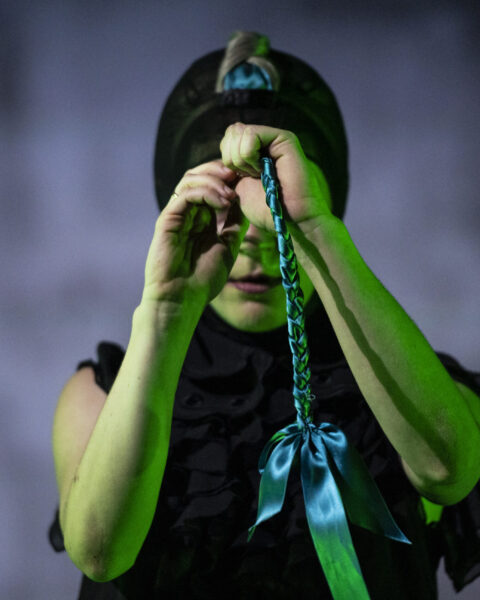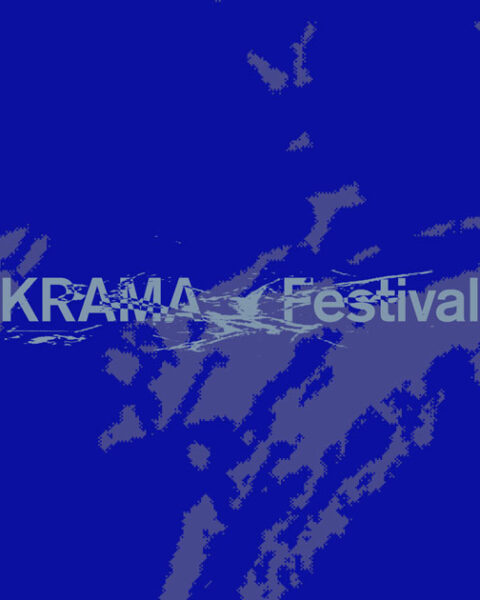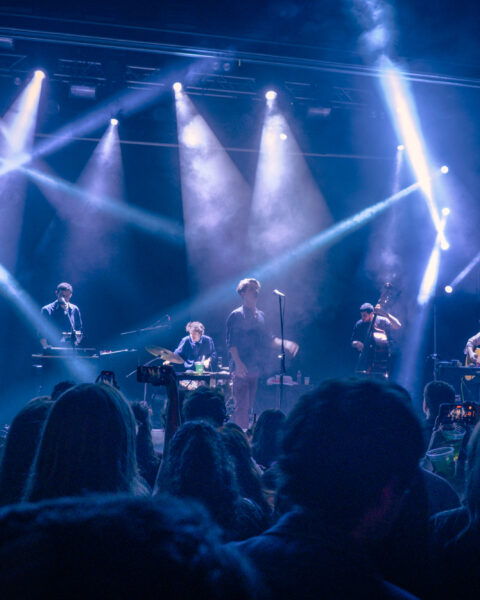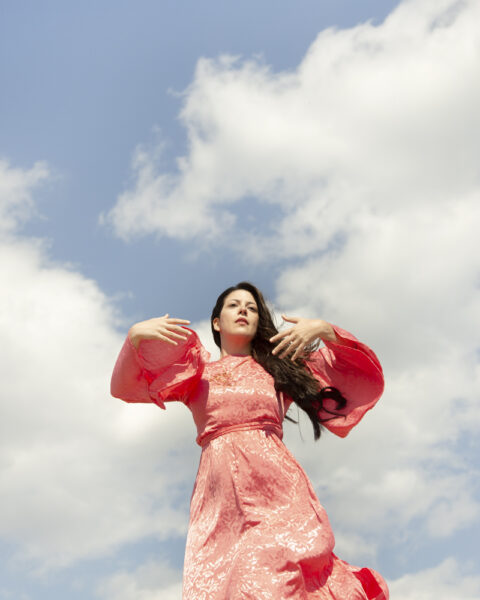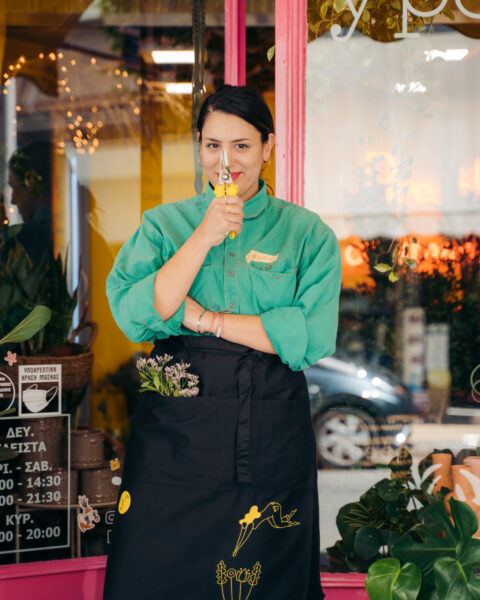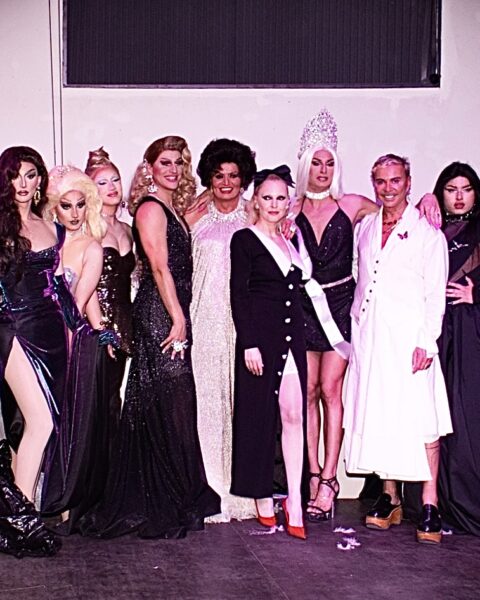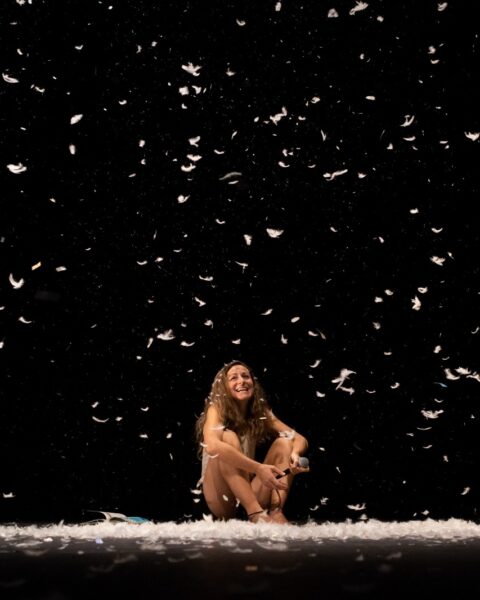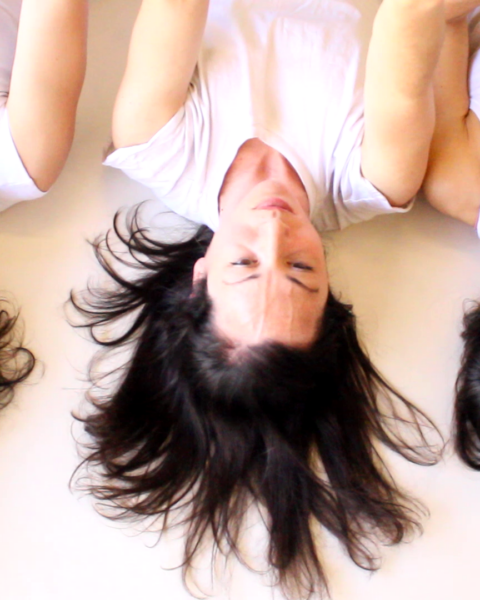After BLUE, the first part of a theatrical color pentalogy created by the theater group «Bleu en Haut Bleu en Bas» (Blue Above Blue Below) based in Switzerland and premiered in 2016 in Geneva, Anna Lemonaki returns to Athens with success of her latest project G.O.L.D. which premiered at the Festival de la Bâtie in August 2022.
The G.O.L.D. it is inspired by today, a society that fundamentally divides and structures society into triumphant winners and insignificant losers.
What might happen if we let go of the pressure created by the imperative to succeed? We all face failure on a regular basis, but we tend to deny it, to avoid the subject, because we have learned to keep our failures hidden. Dazzling success, intoxicating glory and the need for recognition are idealized. Failure is not even an option and is always associated with shame. First, we focus on the stories of our lives that are connected to success. What happens if we balance the balance, that is, if we give voice and space to both imperfections and all that they contain?
There are small, everyday failures that have little effect on us, stinging and pitiful failures, and larger, brilliant, even majestic failures that are frighteningly beyond our powers, that can affect us significantly, that remind us of our weaknesses and the our own fragility – we feel discouraged, broken, on the edge of the abyss, but what happens when we recover, when we rise? Many are the possible reactions: flight, self-criticism, reorientation, panic, indifference, self-flagellation, inertia, relentless self-criticism, denial, or an apocalypse that reveals the futility and emptiness of past aspirations…
From luxury to poverty, from the ultimate moment of joy to tragedy, from power displayed to fragility concealed or revealed, through all these moments of transition and their exaggerated “landscapes” G.O.L.D. travels.
In Switzerland, after Blue, Anna created Bloody Fuchsia, White, G.O.L.D. (Glory or Little Dreams) and is now preparing Black – What a Beaty-Full Catastrophe which will be staged at the Comédie de Genève in 2025.
At the same time, she is preparing her first choreographic project and film Kiss and Fly.
BIOGRAPHY ANNA LEMONAKI
Anna was born in Athens. It grows in Panama, Crete and Athens. He obtained a degree in Political Science in Athens and Bergen in 2006 and a master’s degree in Sociology and Media from the University of Friborg. He studied at the Serge Martin Theater School (Geneva) and graduated in 2013. He attends workshops with Susan Batson at Interkunst (Berlin, 2014 and 2017), with Andreas Manolikakis (President of the Actors Studio, New York) in Athens and with Damian De Schrijver (TgStan, Belgium) in Geneva in 2018. Followed by CAS in Acting and Text Dramaturgy at HETSR and University of Lausanne (2018-2020).
Anna performs roles for Lena Kitsopoulou in Haire Nymfi (2013), Red Riding Hood – First Blood (2015) and Cry (2018-2021) at the Saint-Gervais Theater in Geneva and at the Techni Theater. He collaborates with, among others, Philippe Quesne, Nikos Karathanos, Adina Secretan, the theater company Cie Daniel Blake for the theater venture Opa (2nd prize – PREMIO 2017). In the cinema he plays the lead role in the film La nuit est encore jeune [The night is still long], directed by Sri Lankan native Indika Udugampola (Promising Director Award at the Colombo International Festival, 2015). She founded the experimental theater and music company Cie Bleu en Haut Bleu en Bas together with the musician Samuel Schmidiger (2015) and presented the first two parts of her quintet, BLEU and FUCHSIA SAIGNANT at the La Bâtie festival in 2019 and the third part BLANC ( SSA Prize, 2020) in Le Grütli (2021). Presents the show P.E.T.U.L.A. bye bye (2017) at the Saint-Gervais theater and at KET in Athens. She is invited by Le Poche theater and directs the play SAPPHOx, written by Sarah-Jane Moloney (2020). In 2002 he presents the G.O.L.D. at the La Bâtie festival. He works as a writer and dramaturg for the dance work Bis N.S (as usual) by the choreographer Ioannis Mantafounis at the Lyon Opera (2021) and the work A la carte at the Frankfurt Dresden Ballet Company (2023). In 2023/2024 he makes the dance-climbing performance and film Kiss and Fly in Leonidio and Tarifa and prepares the project Black: What a Beauty-Full Catastrophe (2025, Comédie de Genève, Geneva).
Reviews for G.O.L.D
At the festival of La Bâtie, the art of flying, falling and flying again.
As we all know, failure is not a bad thing, but a necessary step towards progress. However, in our performance-driven society, success is the only thing we celebrate. In Geneva, before Sion, Vevey and Paris, Anna Lemonaki dispels this cliché.
Le temps, Marie-Pierre Genecand, 2022
A study in failure with poetry, humor and sensitivity, and a brilliant group of performers – hopefully we’ll see it in Athens too.
Giorgos Voudiklaris, EDITORS’ NEWSPAPER, 2022
In “G.O.L.D.” Anna Lemonaki creates an ambitious show with anti-heroes who will deconstruct the myths surrounding her success and her promise of a “happy ending”. It uses the glamor of a ‘fancy’ system to speak to all levels and issues surrounding the world of work and the imperative of careers.
Entry is not recommended for persons under 14 years of age
